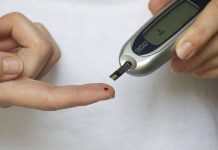Menopause symptoms are usually delineated by the end of a woman’s menstrual periods and the inability to become pregnant, which some women may find liberating; however, there is a downside in that this climacteric change in a woman’s life comes with a myriad of unpleasant symptoms like hot flashes, mood swings, and changes in vaginal health.
“a woman’s natural journey toward menopausal symptoms usually begins with perimenopause, which beings years before entering this climacteric change in her life”
It is important to note, however, that these changes do not happen overnight; technically speaking, a woman has not officially entered this phase in her life until she has gone 12 consecutive months without experiencing a period.
In fact, a woman’s natural journey toward menopausal symptoms usually begins with perimenopause, which beings years before entering this climacteric change in her life. During this time, the ovaries will gradually start to produce less estrogen and progesterone, and most women will experience heavy, irregular periods and also cramping as well.
Although these symptoms will subside as a woman enters this new phase in her life, new challenges will emerge that can affect her sex life with her significant other. In this article, we will take a look at how menopausal symptoms can affect one’s sex life and steps that you can take to improve intimacy between you and your partner.
WHAT ARE THE NEGATIVE EFFECTS OF MENOPAUSE ON A WOMAN’S SEX LIFE?

Indeed, menopause-related symptoms can significantly change the sex life between a woman and her partner and could potentially lead to problems in the relationship that extends beyond the bedroom. Although they can range in terms of severity, some of the more notable menopause symptoms can appear before the one year mark of a woman’s last period including
- Vaginal drynes
- Increased belly fat
- Decreased fertilit
- Hair loss
- Changes in breast appearance
- Low libido
Obviously, these changes can take a toll on any woman’s self-confidence; however, they can also make sex less pleasurable. In fact, pain and discomfort rank as the most common physical symptoms associated with this transitional phase in a woman’s life. Unfortunately, many women are reluctant to speak with their friends or even their physician regarding the symptoms they may be experiencing.
NATURAL REMEDIES TO IMPROVE SEX LIFE DURING MENOPAUSE
“studies show that many women have also found relief by taking testosterone, a male hormone that helps boost libido”

The first step toward overcoming menopausal symptoms that can disrupt your sex life is by speaking with your physician who can prescribe medication or recommend over-the-counter treatments that can offer relief. According to Dr. Anne Henderson, consultant gynecologist and advisor at BRCA Kent Group, sex and menopause can co-exist.
To further put this into context, Henderson states that many women have benefited from hormone replacement therapy (HRT), which restores normal estrogen levels, the primary female sex hormone responsible for the development and regulation of the female reproductive system.
For example, women can take estradiol and other topical preparations to relieve bladder problems and vaginal or vulvar discomfort. Also, some women may benefit from systemic estrogen and progestogen-based hormone replacement therapy, which can relieve flushing, profuse sweating, anxiety, and other menopausal symptoms.
It is important to note, however, that HRT may not be as effective if a woman is struggling with menopausal symptoms while also feeling sleep deprived or over-burdened with a stressful work or home life. In these cases, lifestyle changes or counseling may be needed in conjunction with HRT. That aside, studies show that many women have also found relief by taking testosterone, a male hormone that helps boost libido. To resolve vaginal dryness, some women have turned to over-the-counter lubricants like K-Y Jelly, for example.
“sex and menopause can coexist; however, there are things that you will have do to make those special moments more pleasurable for you and your partner”
THE TOP TREATMENTS TO EASE NEGATIVE EFFECTS OF MENOPAUSE

The best way to resolve menopausal symptoms is by focusing on the symptoms that are bothering you the most. After all, menopausal symptoms, not to mention the severity of those symptoms, can vary from woman to woman. That said some of the top treatments for menopausal symptoms include
- Vaginal estrogen
- Anti-seizure medications that can reduce hot flashes
- Low-dose antidepressants
- Hormone therapy
It should also be noted that certain high blood pressure medications like clonidine, for example, can also help with hot flashes. Lastly, because osteoporosis is linked to menopausal symptoms, it may be a good idea to increase your intake of vitamin D to improve bone health.
In summation, sex and menopause can coexist; however, there are things that you will have do to make those special moments more pleasurable for you and your partner.
Sources & References:
www.sexualadviceassociation.co.uk/vaginal-dryness-menopause
www.my.clevelandclinic.org/health/articles/16979-estrogen–hormones
www.goodhousekeeping.com/uk/health/a27114795/pain-discomfort-sex-reduced-sex-drive-menopause





















